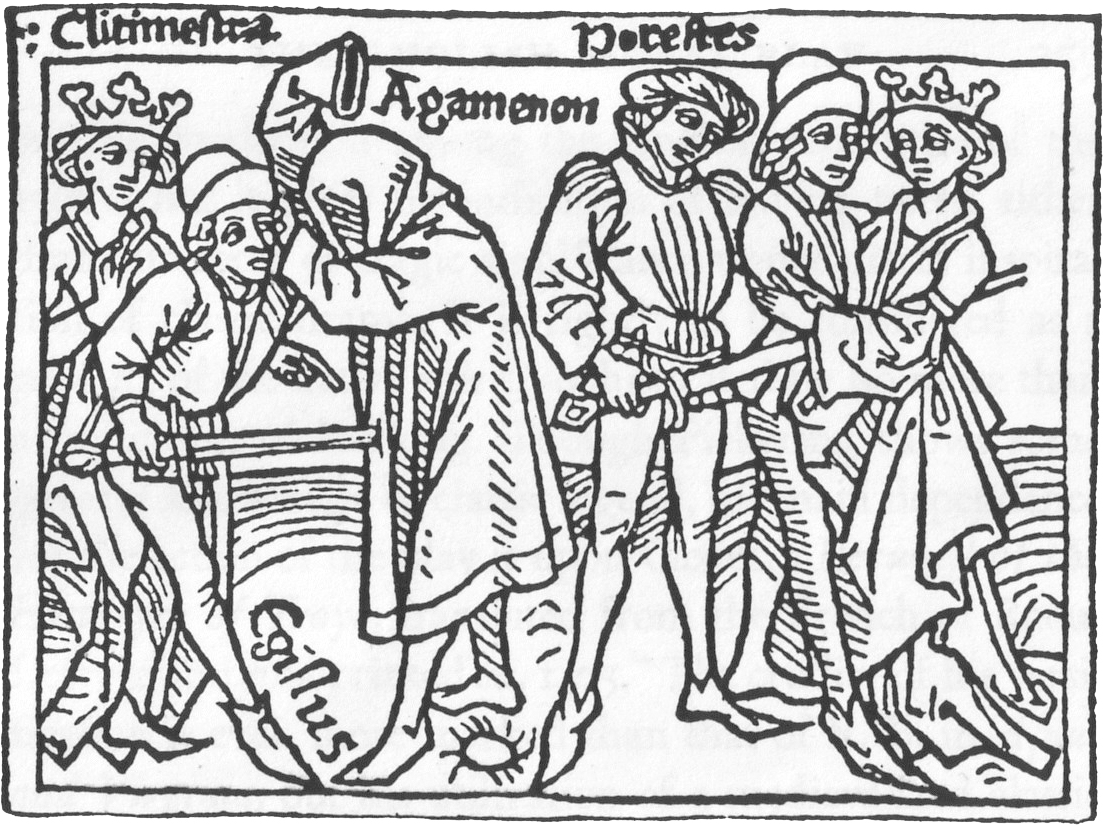- Horestes
Infobox Play
name = Horestes

image_size = 225px
caption = Illustration from a 1473 edition ofBoccaccio's "On Famous Women " of the revenge of Horestes.
writer = John Pickering
premiere = 1567
genre =Morality play "Horestes" is a late Tudor
morality play by the Englishdramatist John Pickering. It was first published in 1567 and was most likely performed by Lord Rich's men as part of the Christmas revels at court that year. [Bevington (1962, 61).] The play's full title is "A new interlude of Vice containing the history of Horestes with the cruel revengement of his father's death upon his one natural mother."ource and text
The play dramatises the story of the
ancient Greek myth of Orestes. Rather thanAeschylus ' trilogy of Athenian tragedies "Oresteia " (458 BCE), however, Pickering's source for his version of the story is William Caxton's translation of the French romance "Recuyell of the Historyes of Troye " (translated in 1475). [Farnham (1936, 259) and Bevington (1962, 179).] Consequently the play's theme anddramatic structure are more medieval than classical. [Bevington (1962, 179).]Only one copy of the play is extant, which the
British Museum holds. [See the introductory note to the facsimile edition (Farmer, 1910); this edition is available online - see below.] It was published by William Griffith ofFleet Street ,London for sale at his shop in St. Dunstan's churchyard. [See the frontispiece to the 1567 edition (above).]tructure and genre
Along with Thomas Preston's "Cambises" (c.1561), the play has been identified as a "hybrid morality", due to its articulation of classical themes, stories and characters with the medieval allegorical tradition. [Spivack (1958, 251-303), Bevington (1962, 58-61), and Weimann (1978, 155).] Within this
genre , the central allegorical figure of the Vice vies with a non-allegorical, classicalprotagonist (Horestes); though their roles are about the same size, Horestes controls the important action. [Bevington (1962, 81-82) and Weimann (1978, 155).]The play has an episodic structure, which alternates comic,
slapstick scenes with serious, tragic ones, all unified by the theme of revenge. [Bevington (1962, 87, 183).] It is one of the earliest examples of an Englishrevenge play , a genre that includes Kyd's "The Spanish Tragedy " (1587), Marston's "The Malcontent " (1603) and Shakespeare's "Hamlet " (1601). [Farnham (1936, 259): "Horestes" can claim distinction because of its earliness in the long line of Elizabethan tragedies of revenge."] Unlike traditional moralities, "Horestes" presents an ambiguous ending.Potter (1975, 119-120).] In line with both the "Orestia" and the "Historyes of Troy", Horestes is forgiven for the murder of his mother and her lover; despite its interrogation during the course of the play, however, the justification for the murders remains an unresolved issue at its conclusion. In a further departure from the conventions of the morality, the forgiveness of Horestes is not prompted by hisrepentance .taging demands
As with other experimental moralities from Elizabeth's reign, "Horestes" is longer than most of the older examples of the genre, running to 1,205 lines. [Bevington (1962, 70).] The play was designed to be played by a company of six players, with each actor performing between three and seven roles each. [See the title page of the play, which gives the original distribution of roles: First player - Vice, Nature, Duty; second player - Rusticus, Idumeus, Soldier,
Menelaus , Nobles; third player - Hodge, Counsel, Messenger, Nestor, Commons; fourth player - Horestes, Woman, Prologue (whose lines do not appear in the printed edition; see Bevington 1962, 82); fifth player - Haltersack, Soldier, Egistus, Herald, Fame, Truth, Idleness, Idumeus; sixth player (probably aboy player ) - Hempstring,Clytemnestra , Provision, Hermione. Also see Bevington (1962, 72-3).] The respective size of the roles of Horestes (521 lines) and the Vice (557 lines), as well as the play's frequent alternation of tragic andburlesque scenes, suggest that the play demanded aplaying company that included two leading actors who were adept at both serious and comic acting. [Bevington (1962, 82-83, 85, 87).] The actor playing Horestes also played the Woman (who appears in a brief scene between lines 626-647), while a boy actor playedClytemnestra and Hermione, as well as Hempstring and Provision. [Bevington (1962, 77).] Unusually for Elizabethan drama, the play shares a role (Idumeus) between two different actors. [Bevington (1962, 89-90).]Characters
*Horestes
*Vice
*Clytemnestra
*Egistus
*Idumeus
*Nestor
*Menelaus
*Hermione
*Rusticus
*Hodge
*Haltersack
*Hempstring
*A Woman
*First Soldier
*Second Soldier
*Herald
*Messenger
*Counsel
*Nobles
*Commons
*Nature
*Provision
*Truth
*Fame
*DutyNotes
ources
* Axton, Marie, ed. 1982. "Three Tudor Classical Interludes: "Thersites", "Jacke Jugeler", "Horestes"." Tudor Interludes ser. Woodbridge, Suffolk: D.S. Brewer. ISBN 0859910962.
* Bevington, David. 1962. "From "Mankind" to Marlowe: Growth of Structure in the Popular Drama of Tudor England." Cambridge, MA: Harvard UP. ISBN 0674325001.
* Farmer, John S, ed. 1910. " [http://www.archive.org/download/historyofhoreste00pikeuoft/historyofhoreste00pikeuoft.pdf The History of Horestes] ." By John Pickering. Tudor facsimile texts ser. Amersham: John S. Farmer.
* Farnham, Willard. 1936. "The Medieval Heritage of Elizabethan Tragedy." Revised ed. Oxford: Basil Blackwell, 1956.
* Potter, Robert A. 1975. "The English Morality Play: Origins, History, and Influence of a Dramatic Tradition." London: Routledge. ISBN 0710080336.
* Southern, Richard. 1973. "The Staging of Plays Before Shakespeare." London: Faber. ISBN 0571101321.
* Spivack, Bernard. 1958. "Shakespeare and the Allegory of Evil: The History of a Metaphor in Relation to his Major Villains." NY and London: Columbia UP. ISBN 0231019122.
* Weimann, Robert. 1978. "Shakespeare and the Popular Tradition in the Theater: Studies in the Social Dimension of Dramatic Form and Function." Baltimore and London: The John Hopkins University Press. ISBN 0801835062.External links
* [http://www.archive.org/download/historyofhoreste00pikeuoft/historyofhoreste00pikeuoft.pdf Online PDF of Tudor Facsimile text of the 1567 edition]
* [http://www.elizabethanauthors.com/horestes01.htm Online original spelling version of the play]
Wikimedia Foundation. 2010.
